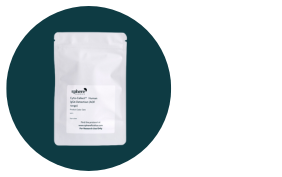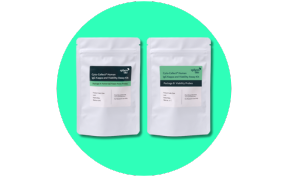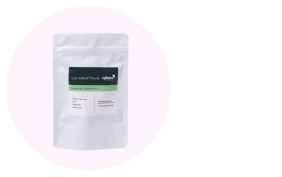We sat down with Kieran, our Director of Quality, to get to know him and what his role entails.
At Sphere Bio, we pride ourselves on always ensuring that our customers receive the highest quality products. We caught up with Kieran Priest, our Director of Quality, to learn more about how we achieve this.
Kieran joined our team earlier this year and has been focused on ensuring quality is at the forefront of what we do, from supervising our quality management system to leading internal audits to drive continuous improvement.
A previous London Marathon Championship time qualifier, Kieran is a firm believer in the benefits of exercise for mental wellbeing and enjoys exercising in his free time. He also prioritizes spending time with his wife and two small children, who all enjoy spending time outdoors in the garden (in the sunshine if they’re lucky here in the UK!).

What does your role involve at Sphere Bio?
As the Director of Quality, I lead the quality function at Sphere Bio, ensuring that our products meet the required regulatory standards and customer expectations.
I wear two hats in the role, one of which is the responsibility for the quality management system and the other is for the quality control (QC) of all the products we produce, whether that’s the factory acceptance testing of the site or QC of the assay kits and other consumables. I think when people use the word quality, their minds automatically go to the latter, and I think what people forget, or don’t realize, is that the more significant part is the quality management system, which ensures that quality is managed on a day-to-day basis.
Often people think that quality control is that last final check, but the way that I like to think of it is the quality management system is the playbook for ensuring quality and efficiency throughout the organization. QC is a part of that, but fundamentally it’s about making sure that the right processes are in place and that they’re managed, which includes everything from training, document control, continuous improvement through to audits.
How did your academic and professional journey lead to this role?
My story actually starts in 2009. Unlike many people, I did not know where I wanted to go in life or my career early on. I remember sitting down with the Deputy Head of Sixth Form and her asking what I wanted to do at University – I wasn’t sure. She was a physics teacher, so encouraged me down that route, and I willingly obliged. That was the reason I then ended up doing an engineering degree.
I have military family ties, so in combination with an engineering degree, the next logical step was joining the Royal Air Force (RAF) as an Engineering Officer. Although I’m not one for cliches, the rest is history. I spent nine years in the RAF, where I did management and leadership training before going around various locations, leading engineering teams. During all that, I completed a full-time Master’s degree in Electronic Systems Engineering before moving onto a trials management team. This team was responsible for setting requirements for the conduct and acceptance of hardware and software upgrades to Eurofighter typhoon defensive aid suite.
Finally, nine years in, my experience with the RAF culminated with two and a half years based out of Marshalls. I was originally the fleet manager and then subsequently the continuing airworthiness manager for a fleet of 15 C-130-J aircrafts. This means that I was responsible for all the quality and engineering in the final year that the aircrafts were flying but also during the storage period where the RAF were looking to sell the aircrafts to another nation.
Clearly, I have a passion for complex technology. I also really enjoy the leadership aspect and I think that’s a super important part of this role. The RAF wasn’t cutting it for me personally anymore in terms of stability, moving around when I’ve got two small children and a house is difficult. It was the perfect opportunity when I learnt about the role at Sphere Bio, which involves innovative technology and leadership.
Sphere Bio was particularly attractive to me as I enjoy working with advanced technologies, not necessarily within a particular discipline, but as a culmination and the challenge of making sure it’s all implemented effectively together. That added to the higher purpose of knowing you are doing something good with your skills. That was what attracted me to the life sciences industry specifically, knowing I would be having a tangibly positive impact on the world, if that’s not too cliché.
What do you enjoy most about working at Sphere Bio, and how do you think it differs from other employers?
Besides the many good points that I’ve mentioned about the kind of technologies that the company makes, what really makes Sphere Bio stand out as an employer to me is the people. It’s not just the Company’s culture and core values, but Sphere Bio actually does a fantastic job of fostering that throughout the Company. In addition to the RAF, I’ve worked for about four or five different companies and no other organization that I’ve worked for has put so much energy into making sure that they’re fulfilling what they set out to achieve in terms of their people culture.
As an experienced engineer, are there particular areas of technology that interest you the most?
As I mentioned before, there’s not really one single technical area that garners my interest. It’s more that bringing together of a wide range of technical disciplines. At Sphere Bio it’s the electronics, pneumatics, software, fluidics which hadn’t really been explored before and how the Company is using this system to develop cutting edge technologies. I enjoy the challenge of making sure the complex systems all are working seamlessly together. I especially enjoy working with these technologies when the end goal is to create something that delivers those real world benefits, which could be related to healthcare or beyond.
From your perspective, what sets Sphere Bio’s technology apart from other tools in the market?
Sphere Bio’s technology stands out from current processes – what’s currently done is time consuming, costly, inefficient and difficult to scale. The Cyto-Mine and now the Cyto-Mine Chroma systems completely change the process, making it automated, faster and easier to integrate. All of this is great but I think what makes Sphere Bio’s technology stand out to me comes in when looking at the environmental impact of Cyto-Mine and Cyto-Mine Chroma versus other tools. Sphere Bio’s platforms offer a 10 to 100 times reduction in plastic waste versus other methods and a 5 to 10 times reduction in energy use as well.
Not only are these platforms giving researchers a faster, more assured output, but they also massively tick that box of significantly reducing environmental impact. To be able to say not only are we doing it quicker but we’re going to reduce your waste as well, I think that is truly impressive.
Can you explain what a quality certification like ISO9001 is? What processes does the Company follow to ensure continuous improvement of its quality management system?
ISO9001 is an internationally recognized standard that ensures a company has a structured quality management system in place. A quality management system is the playbook, a process-oriented approach to define what the workflows of a company are and to optimize them, making sure everything is consistent and efficient.
Being ISO9001 certified demonstrates that a company is set-up to meet customer and regulatory requirements. A key aspect of this is continuous improvement. We’ve recently refreshed our quality policy and one of the six themes of that new quality policy is continuous improvement, which we do a lot of. We have internal quality reporting on incidents, which helps to improve processes when something goes wrong. We also implement corrective and preventive actions to stop these incidents from happening again. One of the things I have been implementing is lowering the bar for reporting, so that we not only look at what’s gone wrong, we also look at and report potential incidents to stop these from occurring. It’s generally more effective to be proactive and stop something before it becomes an incident, and we can start trending observations as well to find improvements.
We run internal audits, where we go round all the departments once a year. Part of what the internal audit questions assess is continuous improvement, asking teams what they are specifically doing to improve. To support that, we also offer training events. One of the recent training sessions was on Six Sigma, which encourages continuous improvement at all levels in the Company. Another big piece is lesson identification and learning sessions. If we’re doing a particularly large or complex project, or when we’re doing something for the first time, we’ll have a 30 to 60-minute debrief to discuss what happened and what we can do better next time. Sphere Bio is a company that is constantly looking to learn and do better.
Can you tell us more about the recent rebrand to Sphere Bio and how this reflects the Company’s commitment to providing best-in-class solutions for the life science industry?
From a marketing and operational perspective, I think it’s fantastic and shows strong intent by better informing customers and reflecting the products and services that the Company provides in terms of being the best-in-class for life sciences. It’s also important to highlight that the quality of the products and the people hasn’t changed but the name just better reflects what’s provided and what we do.




